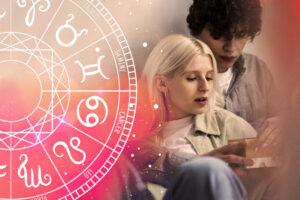
Marriage is one of the most significant decisions in a person’s life. It marks the beginning of a new chapter, filled with love, companionship, and shared dreams. However, finding the right partner can be challenging. This is where astrology steps in, offering guidance through the ancient practice of marriage matching, also known as Kundli matching for horoscope matching.
Marriage matching is an essential aspect of Vedic astrology, used to determine the compatibility between two individuals. By analyzing the birth charts of both partners, astrologers can predict how well they will get along, their potential challenges, and the overall harmony in their relationship. This process helps ensure a strong, happy, and lasting marriage.
What is Marriage Matching in Astrology?
Marriage matching involves comparing the horoscopes of two individuals to assess their compatibility. A horoscope, or Kundli, is a detailed map of the planets’ positions at the time of a person’s birth. This chart provides insights into various aspects of a person’s life, including personality, career, health, and relationships.
In marriage matching, the astrologer compares key elements of each partner’s Kundli, such as their Moon sign, ascendant, and the positions of specific planets like Venus and Mars, which govern love and passion. The goal is to identify how these elements interact and influence the couple’s relationship.
The Process of Marriage Matching
Marriage matching typically follows a systematic process that includes the following steps:
Guna Milan (Ashtakoot Matching): The most common method of marriage matching is Guna Milan, also known as Ashtakoot matching. In this method, eight different aspects of the couple’s horoscopes are compared. Each aspect, or “Koot,” is assigned a certain number of points, with a total of 36 points available. The higher the score, the better the compatibility.
- Varna (1 point): This aspect assesses the spiritual compatibility between the couple.
- Vashya (2 points): This measures the power dynamics and mutual control in the relationship.
- Tara (3 points): This looks at the health and well-being of the partners.
- Yoni (4 points): This examines sexual compatibility and physical attraction.
- Graha Maitri (5 points): This assesses the intellectual and mental compatibility between the couple.
- Gana (6 points): This considers the nature and temperament of the partners.
- Bhakoot (7 points): This looks at the financial and emotional stability in the marriage.
- Nadi (8 points): This examines the genetic compatibility and potential for offspring.
A score of 18 points or more is generally considered favorable for marriage. However, it’s important to remember that a lower score doesn’t necessarily mean the marriage will fail; it simply indicates potential areas where the couple may need to work harder to maintain harmony.
Manglik Dosha Matching: Another critical aspect of marriage matching is checking for Manglik Dosha. This occurs when Mars is placed in specific houses in the birth chart, potentially leading to conflicts and difficulties in marriage. If one partner has Manglik Dosha and the other doesn’t, it can create imbalance and challenges in the relationship. However, there are remedies and solutions to mitigate its effects.
Navamsa Chart Analysis: The Navamsa chart is a divisional chart that provides deeper insights into marriage and relationships. It is considered a supplementary chart to the main horoscope and plays a crucial role in understanding the true nature of the marital bond. Astrologers use the Navamsa chart to assess the longevity, happiness, and challenges in the marriage.
Dosha and Dasha Analysis: In addition to Guna Milan and Manglik Dosha, astrologers also analyze other doshas (flaws) and dashas (planetary periods) that may influence the marriage. This helps in identifying potential obstacles and provides opportunities to take corrective measures before marriage.
Why is Marriage Matching Important?
Marriage matching is more than just a traditional practice; it offers several practical benefits:
- Compatibility: By analyzing the birth charts, astrologers can determine the compatibility between partners in various aspects, such as emotional connection, physical attraction, intellectual alignment, and spiritual understanding. This helps in building a strong foundation for the marriage.
- Predicting Challenges: Astrology allows couples to foresee potential challenges and areas of conflict in their relationship. By being aware of these issues in advance, couples can work together to overcome them and build a more harmonious relationship.
- Remedial Measures: If the horoscope matching reveals doshas or unfavorable planetary positions, astrologers can suggest remedies to mitigate their effects. These may include performing specific rituals, wearing gemstones, or following certain lifestyle practices to enhance compatibility and ensure marital bliss.
- Long-Term Stability: A well-matched horoscope ensures long-term stability and happiness in the marriage. It helps couples understand each other’s strengths and weaknesses, leading to a more balanced and fulfilling relationship.
Marriage matching through astrology is a time-honored practice that helps couples find compatibility and harmony in their relationship. By analyzing the birth charts of both partners, astrologers can provide insights into the strengths and challenges of the marriage, allowing couples to make informed decisions and take steps to ensure a successful union.
Whether you believe in astrology or simply curious about the process, marriage matching offers valuable guidance for one of life’s most important decisions. Embrace the wisdom of the stars, but remember that love, understanding, and commitment are the true keys to a lasting and joyful marriage.


